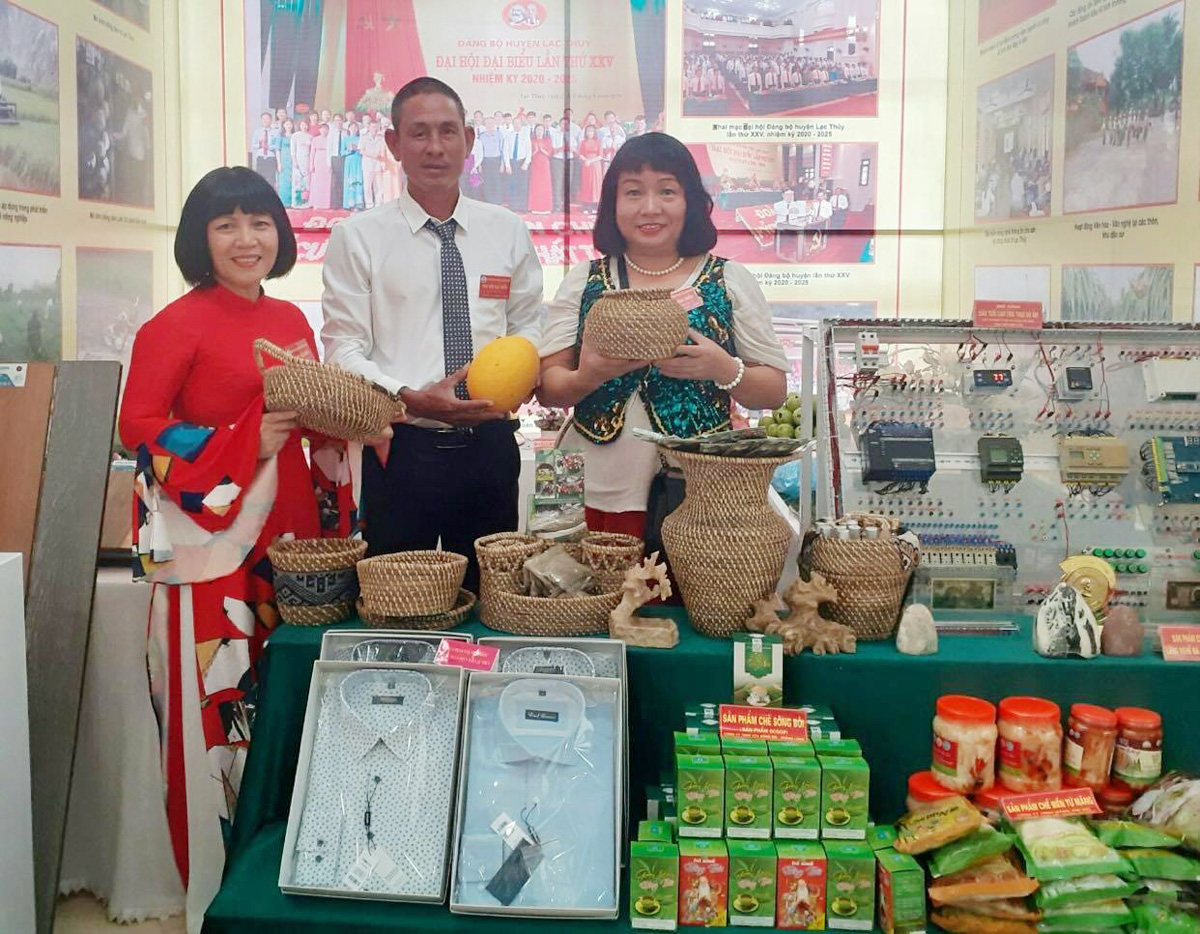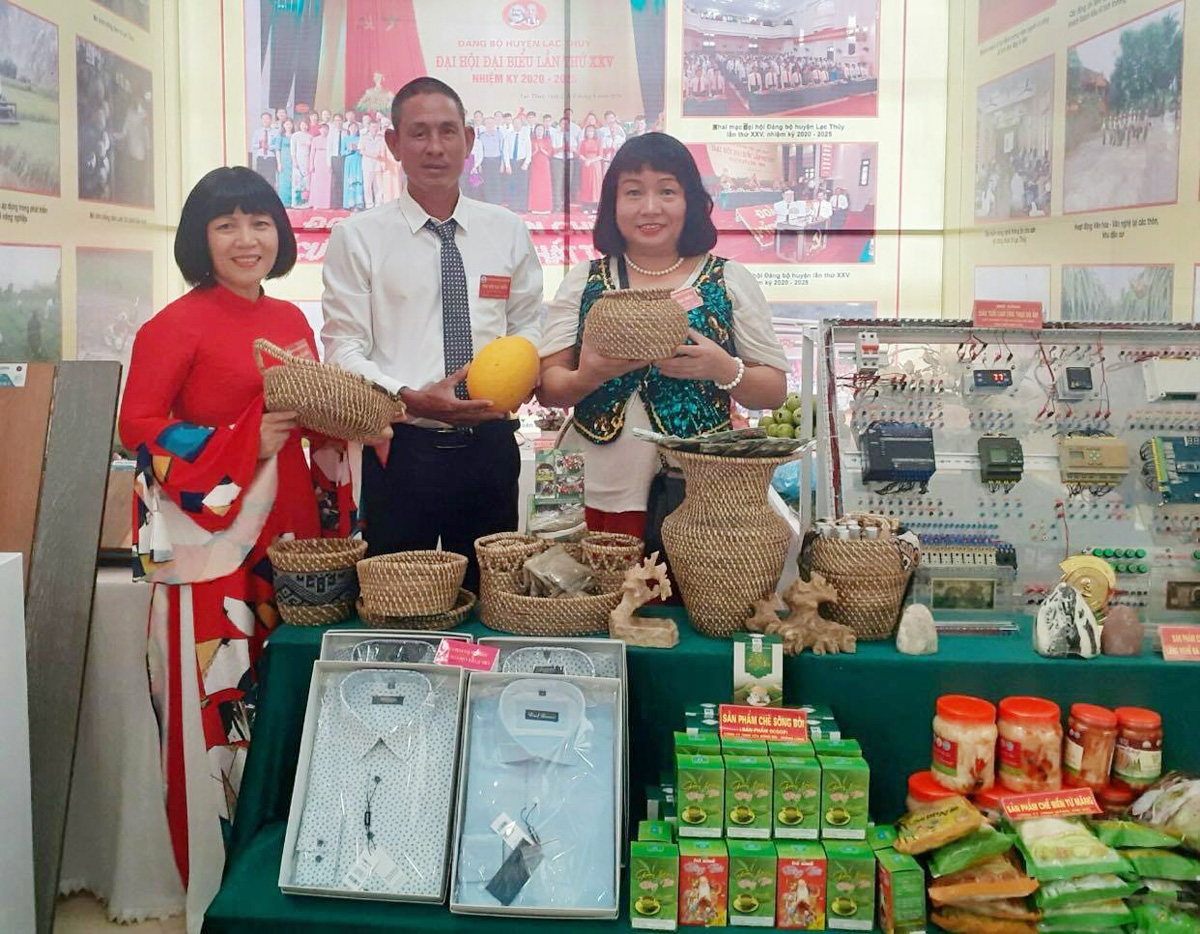
(HBO) - Many households in the remote commune of An Binh in Lac Thuy district have planted lemongrass in the alluvial land, and even exhausted fields, and they have ensured stable supply of materials for businesses.
 Lemongrass rattan products are on display at the 25th Party
Congress of Lac Thuy district’s party committee.
Lemongrass rattan products are on display at the 25th Party
Congress of Lac Thuy district’s party committee.
According to Quach Thi Luyen in Tien Lu village, she harvests lemongrass every 40-60
days, and earns some 900,000 VND (38.71 USD) per 360 square metres, which means
she pockets tens of millions of VND from lemongrass growing.
Several local residents gain more as they engage in lemongrass essential oil
production.
An Binh is currently the only place that produce lemongrass rattan products in
the nation. Local products have been favoured by customers nationwide.
Director of the An Lac Hoa Eco-tourism joint Stock Company Ta Thi My Phuong
said her firm’s products have been sold like hot cake in Ho Chi Minh City,
Hanoi, and Thai Nguyen, Bac Can and Cao Bang provinces, adding many products
are customised while many others have been sent to the UK and France as gifts.
The lemongrass rattan craft has been developed in the locality since 2018.
Earlier, the communal People’s Committee joined hands with local enterprises to
organise training courses for 100 rural labourers. Currently, nearly 30 workers
are engaging in the rattan craft, with average income of more than 4 million
VND per month per worker. Additionally, over 20 households in Tien Lu and Dong
Van villages get money from their lemongrass cultivation model with an area of
10 hectares.
By 2020, the commune’s income per capita topped 53 million VND, while poverty
rate slid to 4.37 percent.
According to the Vice Chairman of the communal People’s Committee, the
lemongrass rattan craft has made significant contributions to promoting local
economy and sustainable poverty alleviation in recent three years.
The commune has built the lemongrass rattan products to make them meet the
standards of the One Commune-One Product programme, he said, adding the move
aims to stimulating the economy and increasing value of the local products./.
According to data from the Hoa Binh Provincial Party Committee, the industrial production index for the first six months of 2025 is estimated to have increased by 20% compared to the same period last year. This marks the highest year-on-year growth rate for this period since 2020.
In the first six months of 2025, Hoa Binh province’s export turnover was estimated at 1.145 billion USD, marking an 18.11% increase compared to the same period in 2024. Import turnover was estimated at $ 804 million, a 17.15% increase, which helped the province maintain a positive trade balance.
The lives of the ethnic minority farmers in Tan Lac district have gradually improved thanks to the new directions in agricultural production. This is a testament to the collective strength fostered through the professional associations and groups implemented by various levels of the district’s Farmers’ Union.
With the motto the "product quality comes first,” after nearly one year of establishment and operation, Muong village’s Clean Food Agricultural and Commercial Cooperative, located in Cau Hamlet, Hung Son Commune (Kim Boi district), has launched reputable, high-quality agricultural products to the market that are well-received by consumers. The products such as Muong village’s pork sausage, salt-cured chicken, and salt-cured pork hocks have gradually carved out a place in the market and they are on the path to obtaining the OCOP certification.
In the past, the phrase "bumper harvest, rock-bottom prices" was a familiar refrain for Vietnamese farmers engaged in fragmented, small-scale agriculture. But today, a new spirit is emerging across rural areas of Hoa Binh province - one of collaboration, organisation, and collective economic models that provide a stable foundation for production.
Maintaining growing area codes and packing facility codes in accordance with regulations is a mandatory requirement for agricultural products to be eligible for export. Recently, the Department of Agriculture and Environment of Hoa Binh province has intensified technical supervision of designated farming areas and packing facilities to safeguard the "green passport" that enables its products to access international markets.



 Lemongrass rattan products are on display at the 25th Party
Congress of Lac Thuy district’s party committee.
Lemongrass rattan products are on display at the 25th Party
Congress of Lac Thuy district’s party committee.